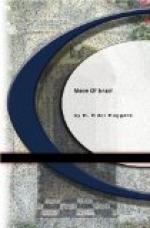“There we are troubled, Prince, for it would seem—unless we are deceived—that you have met her often and often; that you have known her for thousands of years, as you have known that man at your side for thousands of years.”
Seti’s face grew very interested.
“What do you mean, Magician?” he asked, eyeing him keenly. “How can I who am still young have known a woman and a man for thousands of years?”
Ki considered him with his strange eyes, and answered:
“You have many titles, Prince. Is not one of them ‘Lord of Rebirths,’ and if so, how did you get it and what does it mean?”
“It is. What it means I do not know, but it was given to me because of some dream that my mother had the night before I was born. Do you tell me what it means, since you seem to know so much.”
“I cannot, Prince. The secret is not one that has been shown to me. Yet there was an aged man, a magician like myself from whom I learned much in my youth—Bakenkhonsu knew him well—who made a study of this matter. He told me he was sure, because it had been revealed to him, that men do not live once only and then depart hence for ever. He said that they live many times and in many shapes, though not always on this world, and that between each life there is a wall of darkness.”
“If so, of what use are lives which we do not remember after death has shut the door of each of them?”
“The doors may open again at last, Prince, and show us all the chambers through which our feet have wandered from the beginning.”
“Our religion teaches us, Ki, that after death we live eternally elsewhere in our own bodies, which we find again on the day of resurrection. Now eternity, having no end, can have no beginning; it is a circle. Therefore if the one be true, namely that we live on, it would seem that the other must be true, namely that we have always lived.”
“That is well reasoned, Prince. In the early days, before the priests froze the thought of man into blocks of stone and built of them shrines to a thousand gods, many held that this reasoning was true, as then they held that there was but one god.”
“As do these Israelites whom I go to visit. What say you of their god, Ki?”
“That he is the same as our gods, Prince. To men’s eyes God has many faces, and each swears that the one he sees is the only true god. Yet they are wrong, for all are true.”
“Or perchance false, Ki, unless even falsehood is a part of truth. Well, you have told me of two dangers, one to my body and one to my heart. Has any other been revealed to your wisdom?”
“Yes, Prince. The third is that this journey may in the end cost you your throne.”
“If I die certainly it will cost me my throne.”
“No, Prince, if you live.”
“Even so, Ki, I think that I could endure life seated more humbly than on a throne, though whether her Highness could endure it is another matter. Then you say that if I go upon this journey another will be Pharaoh in my place.”




